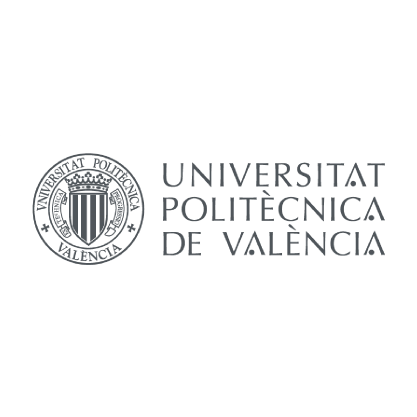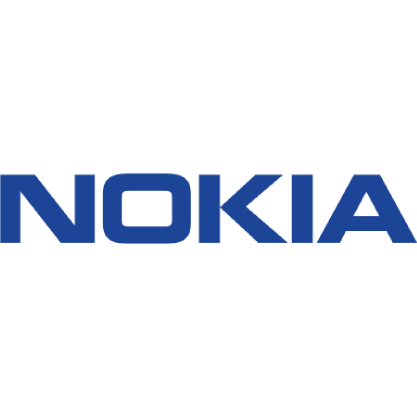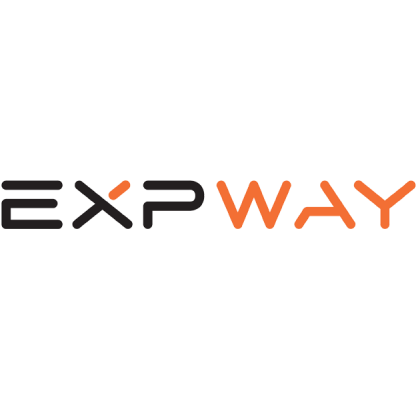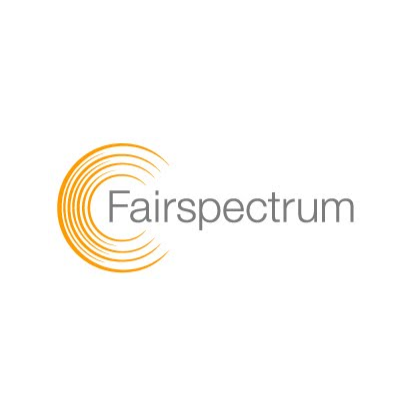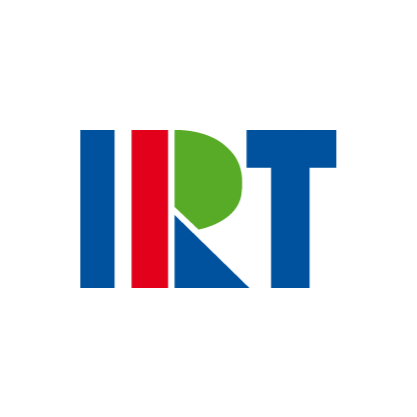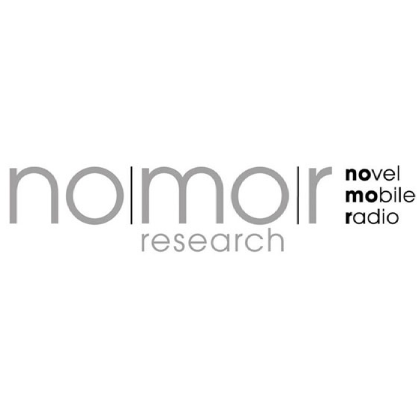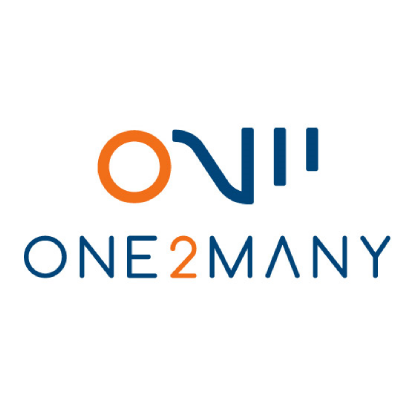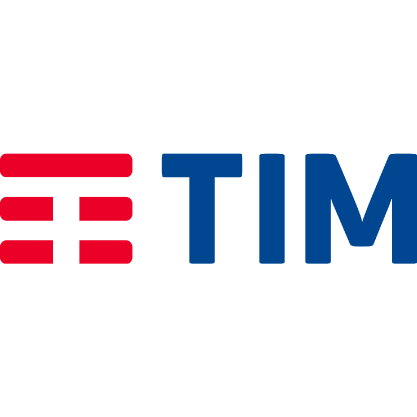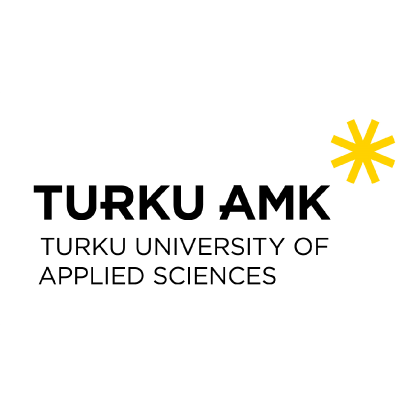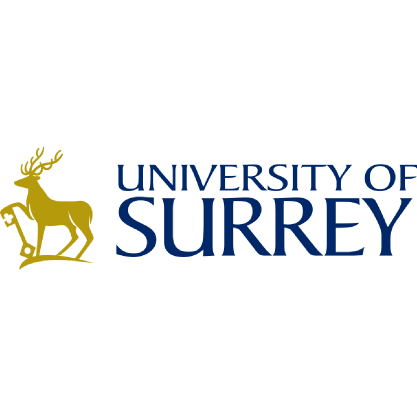A project of this type could not be successful without a large, experienced and balanced set of partners
whose expertise covers the complete Media and Entertainment (M&E) value chain.
Altogether a total of ten countries are represented. Eight Member States: Finland, France, Germany, Italy, Netherlands, Spain, Hungary and the UK, and two Associated Countries: Israel and Switzerland. The map below outlines the 5G-Xcast consortium
and the ten countries represented.
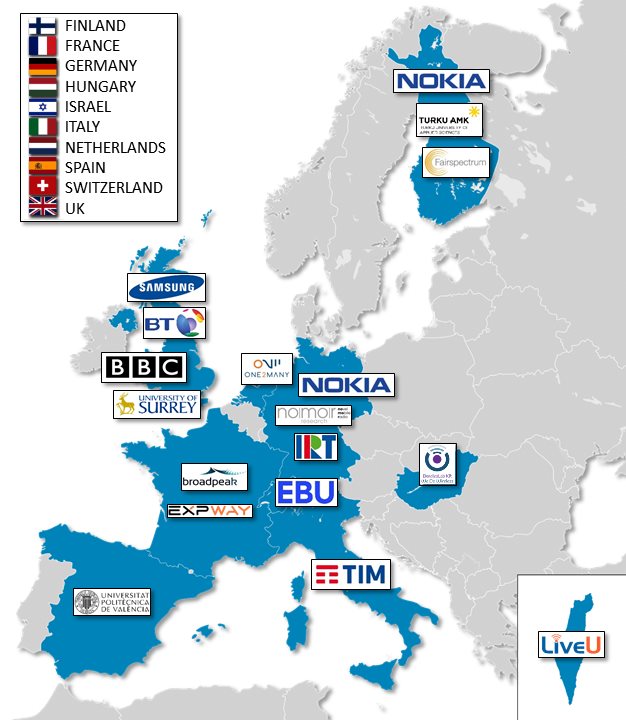
PROJECT PARTNERS
In particular, the consortium is made up of one public service broadcaster (BBC), the European Broadcasting Union (EBU), two telecom operators (BT and Telecom Italia), two telecom vendors and manufacturers (Nokia Germany and Finland, and Samsung UK), three universities (Universitat Politecnica de Valencia, Turku University of Applied Sciences and the 5GIC in the University of Surrey), and eight SMEs (Broadpeak, BundlesLab, Expway, Fairspectrum, IRT, LiveU, Nomor, and One2many). Note that IRT is considered as a non-profit making SME. The consortium has a good balance between scientific and industrial partners at different levels of the M&E value chain that the project is targeting. Each consortium member is listed in the table below:
The UPV’s iTEAM research institute will take the role of project coordinator of 5G-Xcast and will mainly work on the design and performance evaluation of 5G Point-to-Multipoint Radio Access Network, leading the task on the physical layer air interface of 5G Broadcast. UPV will bring its expertise in digital broadcast standardization (e.g. DVB-T2, DVB-NGH, ATSC 3.0) and 5G design (e.g. participation in METIS and METIS-II, leading 5G system-level simulation tasks) and in the evaluation group for the ITU-R Recommendations for next generation cellular wireless communication systems.
business operates at the forefront of each generation of mobile technology. Their global experts invent the new capabilities our customers need in their networks. Nokia provides the world’s most efficient mobile networks, the intelligence to maximize the value of those networks, and the services to make it all work seamlessly. Nokia is represented in 5G-Xcast through two legal entities.
BBC R&D contributes to the setting of international standards, and has played key roles in groups such as MPEG (Moving Picture Experts Group), the Pro‐MPEG Forum, TV‐Anytime, the EBU and DVB. BBC R&D has participated in many successful EC‐funded projects since the early 1990s, including VALIDATE, MATRIS, MyMedia, Presto4U, FascinatE and RE@CT. BBC R&D has an excellent track record for commercialising the application of project results. For example, a real‐time image‐based camera tracking system developed by the BBC in the EU FP6 MATRIS project was commercialised as a part of the Piero sports graphics system, which won an IBC Innovation Award in 2006 and a Queen’s Award in 2011.
mobile 4G customer base of 15.1 million. BT also provides network services to other licensed operators. BT’s main research and development centre is in Adastral Park in Suffolk, UK, and is home to over 3,700 of BT’s top scientists, engineers and business people. Their employees include many who are world leaders in their specialist fields, working at the forefront of new technologies and standards development in areas such
as broadband applications and services, IP and data networks, IT, mobility and converged services, network design and management, and business applications and services.
BT is an active participant in European collaborative research and development and has participated in all the past EU Framework Programmes, primarily in the ICT area. Within the Horizon 2020 Programme BT is currently participating in six projects, whilst within the 7th Framework Programme we co-ordinated four projects, provided technical leadership on
two further projects and partnered in twenty four other projects.
LiveU’s solutions use multiple IP links together. Such links may include 4G LTE/3G, HSPA+, WiMAX, satellite, DSL and Wi-Fi. LiveU technology optimizes the utilization of each and all links for maximum video quality based on the available network conditions. LiveU creates a consistent bandwidth and a reliable broadband connection for acquiring, managing and distributing high quality live and recorded content over IP.
LiveU’s cutting-edge multilink technology enables broadcasters and others to deliver real-time 1080p video and even 4K and 3D/AR streams, using H.264 and HEVC encoding.
As part of the 5G-Xcast project, LiveU provides multilink technology to enable the reliable broadcasting of high-quality video over 5G, WiFi and DSL connections in the home or office and seamless mobility.
To achieve a speedier implementation of the country’s coverage in ultra-broadband networks (fibre and 4G) we have planned investments for 2017-2019 of about 5 billion euros. The goal is to close 2019 with 99% fiber coverage, thanks to an acceleration in the so-called “white or rural areas” and the contribution of wireless technologies, and over 99% of the population reached with 4G. At May 2017 coverage has reached approximately 65% of households with fiber and around 97% of the population with 4G.
For TIM customers, convergent offers with innovative digital services and contents, and many applications and devices: such as smartphones, tablets, set top TV decoders, apps and cloud storage. As well as contents: a gaming library, e-books and magazines, music and audiovisual contents enriched with premium contents, such as major sporting events. To simplify the daily life there are new solutions: electronic payment systems, smart homes, electronic medical records and certified electronic mail in the healthcare and government sectors, for the schools interactive multimedia whiteboards and web-based learning environments.
As for the business world, a broad and modular offer: converging calling plans, high speed connectivity, a vast selection of applications for storing and managing data or controlling energy consumption, an advanced platform for cloud computing for the virtualization of applications and infrastructures. For small and medium-sized enterprises TIM Impresa Semplice has developed advanced solutions: services include Certified Electronic Mail, Digital Signature and Digital Invoicing, together with IT solutions based on TIM Digital Store cloud services.
Abroad its strength is Brazil, where TIM Brasil, with more than 61.9 million customers and a market share for the lines of 25.5%, is a major player on the market. Leader in 4G coverage it aims to further develop the new generation infrastructure. The target is to reach 95% of the population in around 3,600 cities by the end of 2019.
TUAS has long continuum of developing wireless technologies and performing related experimental R&D. The work started with DVB-T/H/T2 standardisation in EUREKA/Celtic projects. In Tekes Trial Environment for Cognitive Radio and Network programme the focus was on shared spectrum use with TV white spaces and LSA. Tekes is Finnish national funding agency for innovation and technology. The work has been continued with LTE-systems in Tekes 5th Gear programme in Future of UHF and CORE++ projects.
leading providers of on-line audio-visual content and services in their respective countries. The EBU headquarters are in Geneva, Switzerland, and the regional offices in Beijing, Brussels, Dubai, London, Madrid, Moscow, Rome, Singapore, and Washington D.C. Eurovision (eurovision.net) is the EBU’s unit that provides a range of B2B services in broadcast production and content distribution (utilising satellite, fibre and on-line connections) primarily in the area of live sports, news, and special events, with a global reach. In the area of technological research and development the EBU coordinates a number of projects across the whole media value chain with an objective to coordinate Member’s R&D activities, foster cooperation with the wider multimedia and telecommunications industry and contribute to standardisation (detailed information is available on https://tech.ebu.ch/ourwork). This work results in written deliverables (e.g.
technical reports, recommendations, fact sheets, technical articles), proofs of concept or demonstrators, which are the basis for contribution to external organisations, including SDOs, regulatory and industry fora. The EBU is an active member of a number of standardisation organisations, including ETSI, 3GPP, DVB, ITU, HbbTV, MPEG, DASH-IF, W3C, and SMPTE. As wireless broadband technologies are becoming increasingly important for both production and distribution of audio-visual media content the current EBU’s efforts are directed towards accommodating requirements of public service media providers in 4G/LTE and 5G standards. To that end the EBU is involved in the relevant ETSI and 3GPP work and maintains close collaboration with the mobile industry in the context of our own project group CTN-Mobile (https://tech.ebu.ch/ourwork?categoryFilter=mobile-distribution).
